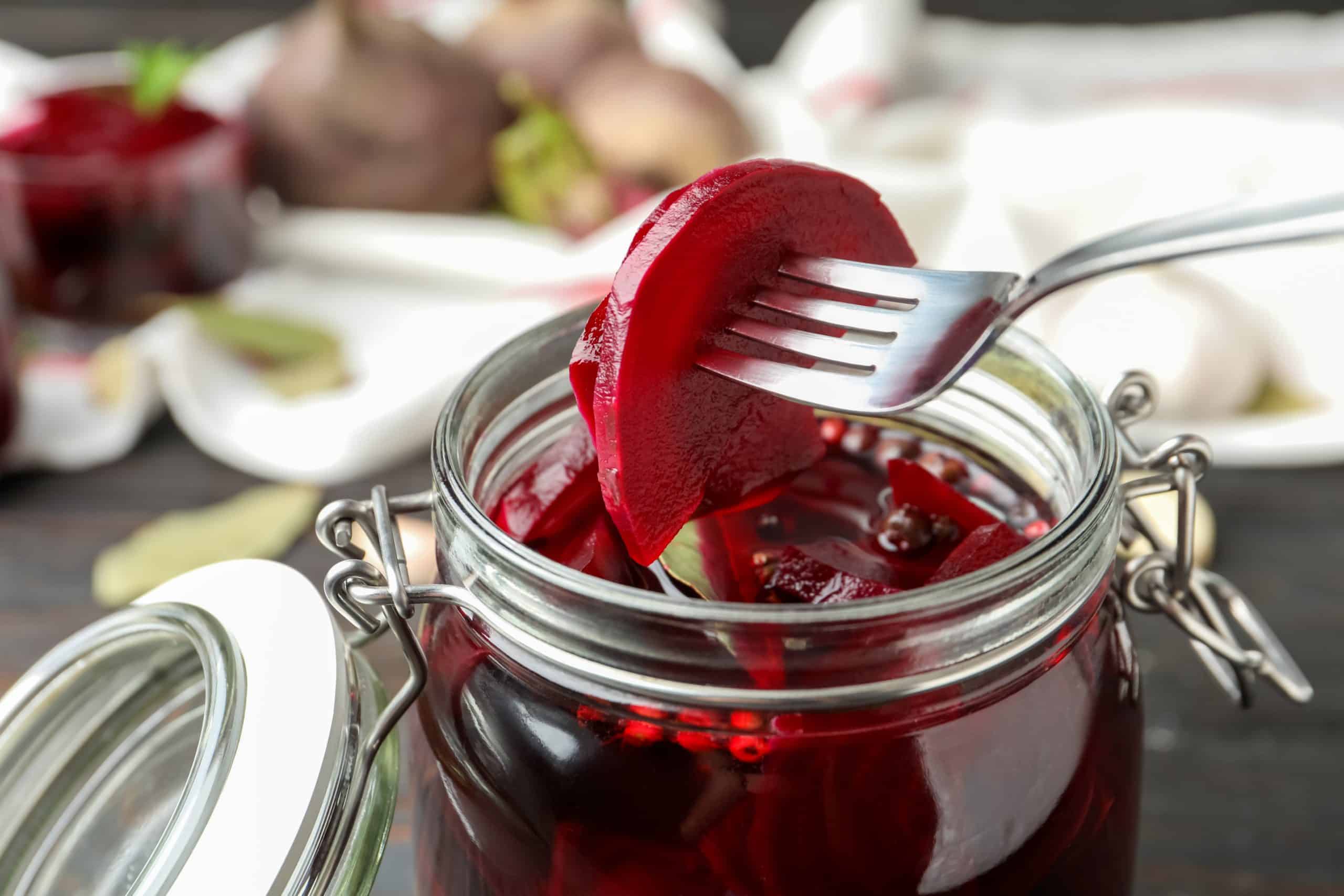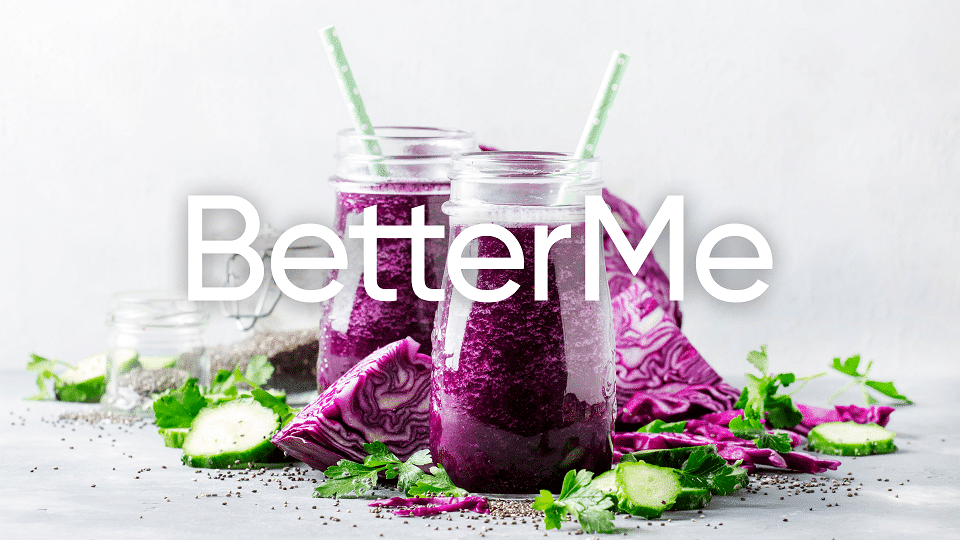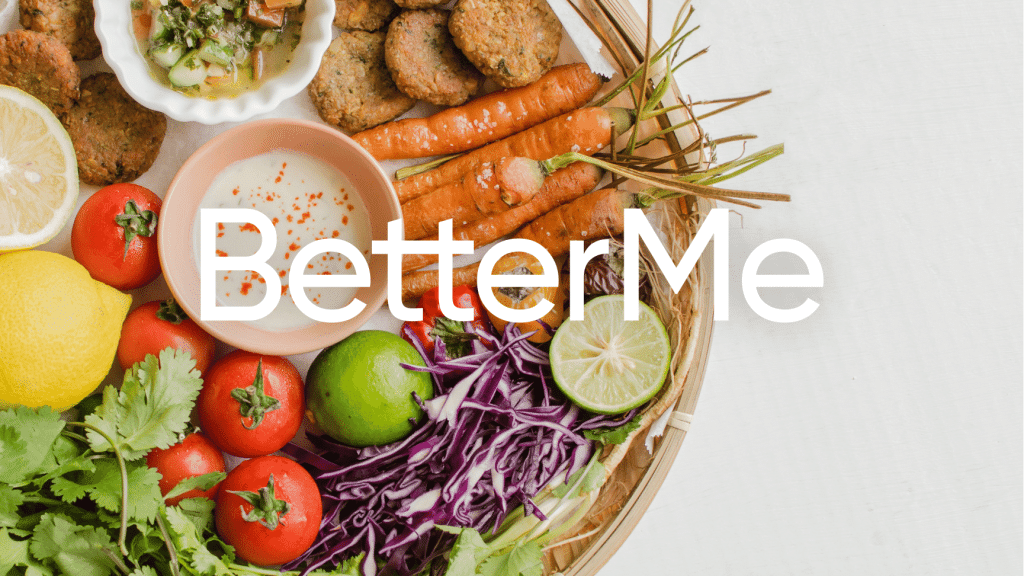Crunchy, tart, and bursting with a unique blend of sweet and sour flavors, pickled beets are more than just a tasty addition to your salad or sandwich. They are a nutritional powerhouse that can add a healthy boost to your diet.
Get your personalized
meal plan!
Beets, in their natural form, are already loaded with essential vitamins and minerals. When pickled, they retain most of these nutrients while also gaining additional benefits from the pickling process.
However, you might be concerned about the high sodium content or the potential effects of the vinegar used in pickling. It’s wise to balance these factors against the nutritional benefits and potential health benefits of pickled beets. That said, are pickled beets good for you? Here’s what you need to know.
Do Pickled Beets Have Too Much Sugar?
Typical pickled beet recipes include sugar as an ingredient, as the sweetness helps to offset the sour taste of the vinegar. The amount of sugar can vary from one recipe to another, making it challenging to determine the exact sugar content in pickled beets. However, not all the sugar used in the recipe is absorbed by the beets; much of it remains in the brine.
Let’s take a closer look at the pickling process and how it impacts the nutritional value of pickled beets.
The pickling process begins with fresh beets that are typically boiled until they are tender. Then, they are peeled and sliced or cubed. A brine is prepared using vinegar, water, sugar, salt, and sometimes other ingredients like onion or spices.
The beets are submerged in this brine and left to soak, usually for several days. This allows the liquid to saturate the beets, resulting in the tangy-sweet taste characteristic of pickled beets.
Despite the addition of sugar, pickled beets’ nutrition stays pretty much the same. Beets are rich in fiber, folate, manganese, potassium, iron, and vitamin C. The pickling process does not significantly diminish these nutrients, which guarantee pickled beets health benefits. However, you should note that the carbs in pickled beets can increase due to the added sugar.
With the added sugar, canned beets calories will be slightly higher than raw or boiled beets. That said, the amount of sugar is still relatively low compared to some other pickled foods.
Are Pickled Beets High In Sodium?
The sodium content of pickled beets is largely derived from the salt used in the brine. Like the sugar, the amount of salt varies depending on the recipe. A single serving can contain anywhere between 150 and 500 milligrams of sodium, a large portion of the recommended daily intake.
If you’re concerned about your salt intake, pickled beets are still an option. You can make them at home, where you have more control over the ingredients used in the brine. This will allow you to adjust the amount of sugar and salt according to your personal preferences and dietary needs.
If you struggle to even flirt with the idea of giving up your favorite foods or working out till your legs give way – BetterMe app is here to breathe a fresh perspective into the way you view the weight loss process! Check out the app and experience the fun side of fitness and dieting with BetterMe!
Are Pickled Beets As Healthy As Regular Beets?
Yes, they are. The pickling process does not significantly diminish the nutritional value of beets; it actually makes them more accessible as they can be stored for a longer period of time.
The pickling process also adds some beneficial probiotics, the same type of healthy bacteria found in fermented foods like yogurt and kimchi.
Let’s review pickled beets’ health benefits based on their nutrient profile:
1. Heart Health Hero
One of the notable health benefits of pickled beets is their contribution to heart health. Beets are a good source of dietary fiber, which can help reduce the risk of cardiovascular disease (5).
Fiber works by binding with cholesterol in the digestive system and removing it from the body before it can be absorbed into the bloodstream (6). In addition, beets contain nitrates, which are converted to nitrous oxide, a substance that can lower blood pressure by dilating blood vessels (3).
2. Digestive Dynamo
The second benefit of canned beets, especially the pickled kind, lies in the realm of digestion.
The dietary fiber in beets aids in improving gut health by promoting regular bowel movements, preventing constipation, and maintaining overall digestive health. Fiber not only adds bulk to your stool but also feeds your gut bacteria, promoting a healthy microbiome (10).
Multiple noteworthy fermented beets benefits arise from the presence of probiotics. These beneficial bacteria may further enhance gut health, boosting digestion and absorption of nutrients. They might also aid in reducing inflammation in the gut, contributing to overall wellbeing (9).
3. Anemia Avoider
Third, pickled beets are rich in iron, an essential mineral for producing red blood cells. Regular consumption of foods high in iron, like pickled beets, can help prevent iron deficiency anemia, a common condition that can cause fatigue, weakness, and a range of other symptoms (14).
Furthermore, the vitamin C in beets enhances the absorption of iron, making it more available for your body to use (11). This combination makes pickled beets a powerful tool in the fight against anemia.
4. Weight Loss Warrior
Fourth on our list is weight management. Despite the carbs in pickled beets, they are relatively low in calories and high in water content, making them a great addition to a weight management diet. The fiber in beets helps to promote feelings of fullness, reducing overall calorie intake.
In addition, the probiotics from the fermentation process can support weight loss. Some research suggests that a healthy gut microbiome may help regulate weight and prevent obesity (17).
5. Immunity Booster
Pickled beets pack a punch when it comes to boosting the immune system. They’re a great source of vitamin C, a powerful antioxidant that helps protect the body against free radicals (20).
Vitamin C is also thought to stimulate the production of white blood cells, the body’s primary defense against infections and diseases (19).
The probiotics in pickled beets might also contribute to a healthy immune system. A significant portion of the immune system resides in the gut, so maintaining a balanced gut microbiome can have positive effects on immune function (13).
6. Energy Enhancer
Sixth, beets are a natural source of dietary nitrates, which are converted into nitric oxide in the body. Nitric oxide helps to improve blood flow, delivering oxygen and nutrients to muscles more efficiently. This may lead to improved physical performance and increased energy levels (15).
In addition, beets contain a good amount of carbohydrates, the body’s preferred source of energy. While the carbs in pickled beets are slightly higher due to the added sugar, they can still provide a steady source of energy.
7. Anti-Inflammatory Ally
Lastly, the benefits of pickled beets extend to fighting inflammation. Beets are rich in betalains, a type of pigment with potent anti-inflammatory and antioxidant properties (12).
Chronic inflammation is linked to many diseases, so incorporating anti-inflammatory foods like pickled beets may have far-reaching health benefits (4).
The probiotics in pickled beets may also have anti-inflammatory effects. Some studies suggest that having a healthy gut microbiome may reduce inflammatory markers and contribute to reduced inflammation (2).
Is It OK to Eat Pickled Beets Everyday?
Yes, you can eat pickled beets every day, but like all foods, they should be part of a balanced diet.
Pickled beets do contain added sugar and sodium from the pickling process. Although these quantities can vary based on recipes, consuming too much added sugar and sodium consistently can have negative effects on health, including an increased risk of heart disease and high blood pressure (18). Therefore, portion control is key when integrating pickled beets into your daily diet.
Although the probiotics in pickled beets are beneficial for gut health, everyone’s response to fermented foods can be different. Some people may experience bloating or digestive discomfort if they’re not used to consuming these types of foods regularly.
Lastly, beets are high in oxalates, compounds that can contribute to the formation of kidney stones in susceptible individuals (8). If you have a history of kidney issues, it’s best to proceed with moderation and caution.
Read more: 3 Healthy Rice Recipes for Weight Loss.
What Is The Healthiest Way To Eat Beets?
Beets can be a healthy addition to your diet in various ways, and the healthiest way to eat them often depends on personal preference and dietary needs. Here are some of the most nutritious ways to enjoy beets:
1. Raw
Consuming raw beets is one way to maximize their nutritional value as none of their nutrients are lost through cooking. They can be grated or thinly sliced into salads or used in smoothies.
2. Roasted
Roasting beets is another healthy option. It brings out their natural sweetness and makes them more palatable for some. To roast beets, simply wrap them in foil and bake until tender. Once cooled, the skin can be easily peeled off.
3. Boiled
Boiling beets is quick and easy, and while it may cause a slight reduction in some nutrients, they still retain most of their nutritional value. Boiled beets can be sliced and used in salads or mashed and used as a side dish.
4. Pickled
While pickled beets do contain added sugar and sodium, they also offer probiotics from the fermentation process. If you enjoy the taste of pickled beets, they can be a healthy option in moderation.
5. Juiced
Beet juice is packed with nutrients and can be a quick and convenient way to incorporate beets into your diet. However, keep in mind that juicing removes the fiber from the beets.
In all these methods, it’s ideal to leave the skin on while cooking or juicing, as it contains a good amount of the beet’s fiber and nutrients. Just be sure to wash the beets thoroughly before use.
Also, don’t forget about the beet greens! They’re edible, rich in nutrients, and can be sautéed, boiled, or added to soups and stews.
What Are The Pros and Cons of Beets?
Beets have numerous benefits, as well as some potential drawbacks. Let’s review the pros and cons of including beets in your diet.
Pros of Beets
- Nutrient-rich: Beets are packed with essential nutrients like fiber, folate, manganese, potassium, iron, and vitamin C. They provide a nutritional punch with relatively few calories.
- Heart Health: The fiber and nitrates in beets can contribute to heart health by reducing cholesterol levels and lowering blood pressure.
- Digestive Health: High in fiber, beets promote healthy digestion and regular bowel movements. Plus, the probiotics in pickled or fermented beets may further enhance gut health.
- Immune Supporting: Beets are rich in antioxidants, particularly vitamin C, which can help support the immune system and protect the body from free radicals.
- Anti-Inflammatory: Beets contain pigments called betalains that have potent anti-inflammatory and antioxidant properties, which may help combat chronic inflammation.
Cons of Beets
- High in Oxalates: Beets are high in oxalates, which can contribute to kidney stone formation in people who are susceptible to this condition (8).
- Added Sugar and Sodium: Pickled beets often have added sugar and sodium, which can increase your daily intake of these components if consumed in large amounts.
- Potential Allergen: While rare, some people may be allergic to beets, experiencing symptoms like hives, itching, or difficulty breathing after consumption (1).
- Change in Urine and Stool Color: Consuming beets can cause a harmless condition called beeturia, where urine and stool can turn a reddish color. While not harmful, it can be alarming if unexpected.
- Digestive Discomfort: Some people might experience bloating, gas or upset stomach after eating beets, especially if they’re not used to eating a lot of fiber (7).
When it comes to weight loss, progress is made by inches, not miles, so it’s much harder to track and a lot easier to give up. BetterMe app is your personal trainer, nutritionist and support system all in one. Start using our app to stay on track and hold yourself accountable!
Frequently Asked Questions
Are Beets Healthier Than Carrots?
Both beets and carrots are healthy vegetables that offer different nutritional benefits. Beets are known for their high levels of folate, manganese, and betalains, a group of potent antioxidants.
Carrots, on the other hand, are rich in vitamin A in the form of beta carotene. Therefore, it’s not about one being healthier than the other but rather about the unique nutrients each can bring to your diet.
Do beets have Omega 3?
No, beets do not contain significant amounts of Omega-3 fatty acids. Omega-3s are primarily found in fatty fish, walnuts, flaxseeds, and chia seeds.
How Many Beets a Day Is Healthy?
There’s no specific number of beets you should eat per day, as it largely depends on your overall diet and health. However, a serving size is typically one medium beet.
As part of a balanced diet, one to two servings of beets per day appears to be a reasonable amount for most people.
Is It Healthier to Drink Beet Juice or Eat Beets?
Both eating beets and drinking beet juice can be healthy, but they offer different benefits.
Beet juice is more concentrated in nutrients and can provide a quicker way to consume these nutrients. However, the juicing process removes the fiber from the beets, which aids digestion and helps you feel full.
Eating whole beets allows you to benefit from all the fiber, which can contribute to overall gut health and satiety. It’s also worth noting that beet juice can be higher in sugar content compared to whole beets, so it’s important to consume in moderation.
The Bottom Line
Pickled beets can be a healthy addition to your diet if you enjoy their taste and consume them in moderation. They provide a wide range of nutrients like fiber, folate, manganese, potassium, iron, and vitamin C that can contribute to overall health.
We recommend eating the beets whole to best benefit from their fiber and nutrient content, but juicing can offer a quick and convenient way to get in your daily servings.
You can also try roasting or boiling them for a delicious side dish or salad topping. However, pickled beets may contain added sugar and sodium, which should be monitored if consumed regularly.
DISCLAIMER:
This article is intended for general informational purposes only and does not serve to address individual circumstances. It is not a substitute for professional advice or help and should not be relied on for making any kind of decision-making. Any action taken as a direct or indirect result of the information in this article is entirely at your own risk and is your sole responsibility.
BetterMe, its content staff, and its medical advisors accept no responsibility for inaccuracies, errors, misstatements, inconsistencies, or omissions and specifically disclaim any liability, loss or risk, personal, professional or otherwise, which may be incurred as a consequence, directly or indirectly, of the use and/or application of any content.
You should always seek the advice of your physician or other qualified health provider with any questions you may have regarding a medical condition or your specific situation. Never disregard professional medical advice or delay seeking it because of BetterMe content. If you suspect or think you may have a medical emergency, call your doctor.
SOURCES:
- Anaphylaxis to beetroot (Beta vulgaris): a case report (2011, ncbi.nlm.nih.gov)
- Anti-Inflammatory and Immunomodulatory Effects of Probiotics in Gut Inflammation: A Door to the Body (2021, frontiersin.org)
- Beneficial Effects of Dietary Nitrate on Endothelial Function and Blood Pressure Levels (2016, hindawi.com)
- Chronic Inflammation (2023, ncbi.nlm.nih.gov)
- Dietary Fiber Is Beneficial for the Prevention of Cardiovascular Disease: An Umbrella Review of Meta-analyses (2017, sciencedirect.com)
- Dietary Fiber, Atherosclerosis, and Cardiovascular Disease (2019, mdpi.com)
- Dietary fiber: Essential for a healthy diet (2022, mayoclinic.org)
- Dietary oxalate and kidney stone formation (2019, journals.physiology.org)
- Effects of probiotics on gut microbiota: mechanisms of intestinal immunomodulation and neuromodulation (2013, ncbi.nlm.nih.gov)
- Health benefits of dietary fiber(2009, academic.oup.com)
- Interaction of vitamin C and iron (1980, pubmed.ncbi.nlm.nih.gov)
- Old-Fashioned, but Still a Superfood—Red Beets as a Rich Source of Bioactive Compounds (2023, mdpi.com)
- Probiotics Regulate Gut Microbiota: An Effective Method to Improve Immunity (2017, mdpi.com)
- Review on iron and its importance for human health (2014, ncbi.nlm.nih.gov)
- Supplementation with Nitric Oxide Precursors for Strength Performance: A Review of the Current Literature (2023, mdpi.com)
- The effect of apple cider vinegar on lipid profiles and glycemic parameters: a systematic review and meta-analysis of randomized clinical trials (2021, biomedcentral.com)
- The Gut Microbiome and Its Role in Obesity (2017, ncbi.nlm.nih.gov)
- The Twin White Herrings: Salt and Sugar (2018, ncbi.nlm.nih.gov)
- Vitamin C and Immune Function (2017, mdpi.com)
- Vitamin C in Disease Prevention and Cure: An Overview (2013, ncbi.nlm.nih.gov)









